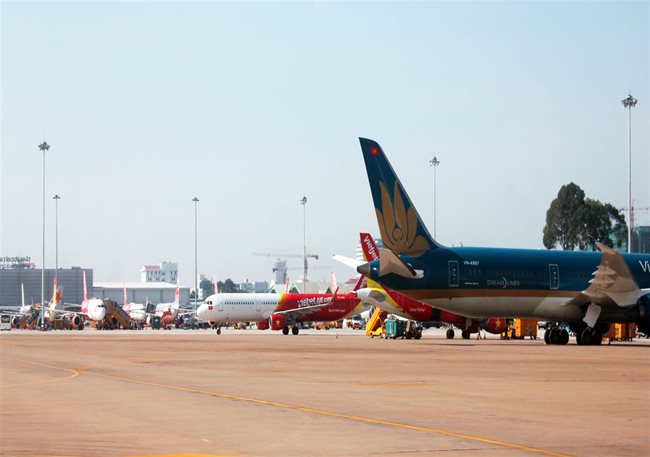|
The dividend payment policy depends largely on business results. During the Covid-19 pandemic, some industries, such as healthcare, food and information technology, still benefit; their business results have not been affected and have even afforded better growth opportunities. Therefore, the businesses concerned have decided to pay attractive dividends to shareholders. In its general shareholders meeting recently, the processed food company Cholimex (CMF) has approved a dividend payment up to 50% of the share price owing to a 60% surge in the 2019 pre-tax profit, which is even higher than its chartered capital. Despite the prolonged Covid-19 situation, CMF has set the 2020 revenue target at VND2.2 trillion and the pre-tax profit target at VND160 billion, and planned to increase production and expand markets to ensure a dividend payment of over 15% for the next phase. Other companies in the processed food industry also have plans for high dividend payment. Masan Consumer, a member of Masan Group, has proposed a cash dividend of up to 45%, and set the 2020 gross revenue growth target at 101-128% against 2019. Vinamilk (VNM) has approved a 2020 dividend payment of at least 50% of the after-tax profit following the 2019 dividend payment expected at 50% minimum. In the technology industry, FPT reported the revenue and the pre-tax profit growth in the first half of this year at 9% and 14% year-on-year respectively, and the per share earning at VND2,078, up 14.1% year-on-year. The company has approved a plan to pay the 2019 dividends with 20% in cash and 15% in shares. For 2020, dividend payment with 20% in cash will be maintained. Given the prospect and the current risk for the economy, enterprises tend to restrict expanding investments, while production and business activities remain sluggish and cannot revert to the normal level as previously. Therefore, many firms cannot make full use of their available resources, and the plan to pay high dividends for shareholders may be chosen. Of note, enterprises which have accumulated large profits retained through years while their demands for capital use in the future will slow down may share the profits to shareholders through dividend payment as a way to support them, many of whom are struggling with difficulties due to losses and impacts of the pandemic. This is also a tactic to boost share prices amid the gloomy market situation. Western Coach Service Company (WCS) has paid the 2019 dividends with 516% in cash, Nam Tan Uyen Industrial Company (NTC) 100%, Central Pharmaceutical Company 3 (DP3) 70%, Oil and Gas Investment and Construction Company (INC) 50%, Saigon Cargo Services Company (SCS) 50% and Noi Bai Cargo Services Company (NCT) 45%. Among these companies, many are facing difficulties in business operations, but they still ensure high dividend payment for shareholders. Da Mai Southwestern Coal-Vinacomin (TND) has decided to share all the profits left before the merger with Cao Son Coal Vinacomin (TCS). After a dividend payment of up to 40% for 2019, TND has continued to pay dividends this year with 53% in cash. Tuong An Vegetable Oil (TAC) has also planned a special dividend payment of up to 75% before the merger with Kido. Stronger financial capacity Enterprises offer high cash dividend payment because they have no need for capital for investment and production expansion in the future, or if they have such need, the profit earned is still insignificant. Meanwhile, companies which pay dividends in shares see it as a way to increase their financial capacity to brace for challenges ahead. In essence, the profit retained for dividend payment is part of the equity capital, together with other items like chartered capital, surplus capital in shares and reserve funds. If enterprises pay dividends in cash, the retained profit will erode and the equity capital will fall correspondingly. Meanwhile, in the case of dividend payment in shares, the retained profit will also erode but the chartered capital will increase proportionately and keep the equity capital intact. In addition, dividend payment in shares may satisfy shareholders, who can sell the shares on the stock exchange upon demand for cash, and at the same time help businesses maintain funds for business expansion purposes in the future. Banks are the representative of this trend, as they usually opt for dividend payment in shares despite huge profits earned, in addition to bonus share payment from surplus capital. For example, shareholders in HDBank will receive 50% of dividends in shares and 15% bonus shares this year, totaling 65% in share payment. ACB will offer a 30% share dividend, VIB a 20% bonus share payment, MBBank a 15% share dividend, OCB a 25-27% share dividend, TPBank 20%, and SHB 11% for 2019 after paying a 20.9% dividend for 2017-2018 early this year. Among listed companies in the non-financial sector, one highlight is the aviation firm Vietjet (VJC). Despite heavy losses due to the pandemic, the general shareholders meeting on July 27 still approved a dividend payment for 2019 with 50% in shares and expected profit from aviation transport this year. By end-2019, VJC had over VND11.5 trillion in undistributed profit. Another company is Power Construction Consulting 2 (TV2). This firm has paid the 2019 dividend with 50% in shares from undistributed profit to increase chartered capital to over VND360 billion, and planned to pay a dividend of over 25% for this year. Trung An Hi-tech Agriculture Company (TAR) plans a dividend of 20%. Clever Group (ADG) plans to pay dividends and issue shares up to 115%. SGT |
||
Ho Le

How can VN stock market attract 'super' investors?
Some government officials say Vietnam needs to attract ‘eagles’, as it calls big and 'super-big' investors, to help upgrade the stock market.

VN stock market grows rapidly in last 20 years
As of the end of 2019, the capitalization value of the securities market at HCM City Stock Exchange (HOSE) had reached 3.28 million of billion of VND, or 54.3 percent of GDP with 2.3 million investors’ accounts.
